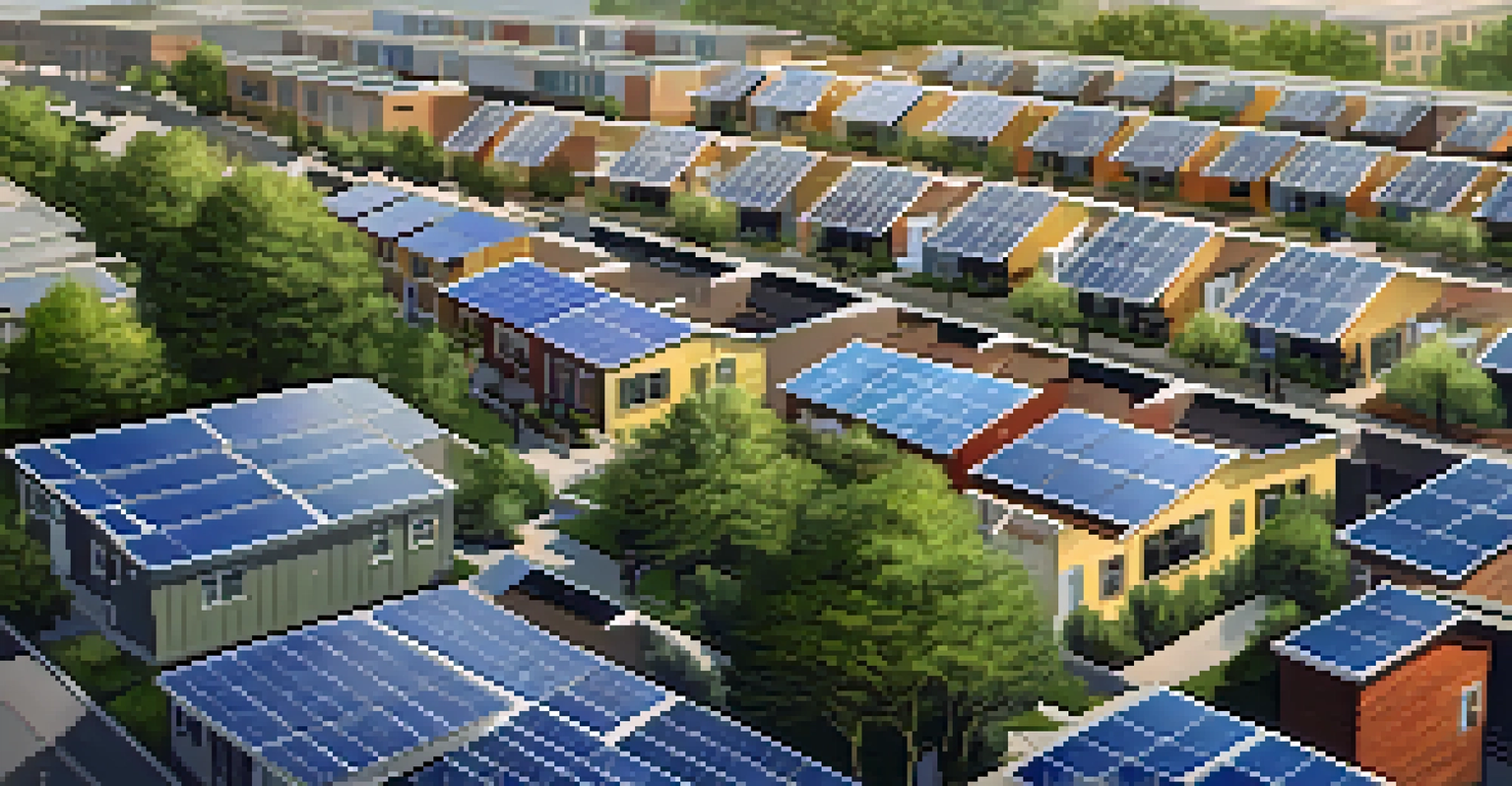Renewable Energy Transition in NYC: An Overview of Progress

Understanding NYC's Commitment to Renewable Energy
New York City has made a bold commitment to renewable energy, aiming to achieve 100% carbon neutrality by 2050. This goal is rooted in the city's recognition of climate change and its impact on urban living. As a bustling metropolis, NYC faces unique challenges, but its dedication to sustainability sets a powerful example for other cities.
The future will be green, or not at all.
The initiative is not just about reducing carbon emissions; it also seeks to create green jobs and enhance residents' quality of life. By investing in renewable energy sources, the city is working to ensure that future generations can enjoy a healthier environment. Importantly, this transition is seen as a pathway to economic revitalization.
Through programs like the NYC Clean Energy Act, the city is taking concrete steps towards harnessing solar, wind, and other renewable sources. This multifaceted approach aims to integrate sustainable practices into the fabric of everyday life in New York.
Key Renewable Energy Projects in NYC
Several innovative projects are currently underway in NYC, showcasing the city's commitment to renewable energy. One standout initiative is the expansion of solar energy installations across rooftops and public buildings, which aims to generate clean power locally. Solar panels not only reduce reliance on fossil fuels but also create jobs in installation and maintenance.

Another significant project is the offshore wind farms being developed off the coast of New York. These farms promise to provide a substantial amount of clean energy and are a critical part of the city's long-term sustainability goals. By harnessing the power of wind, NYC can significantly reduce its greenhouse gas emissions.
NYC Aims for 100% Carbon Neutrality
New York City is committed to achieving 100% carbon neutrality by 2050, focusing on sustainability and the creation of green jobs.
Additionally, the city is investing in energy storage solutions to ensure that renewable energy can be efficiently stored and used when needed. This is crucial for overcoming the intermittent nature of renewable sources, making the entire energy grid more reliable.
Community Involvement and Engagement in Renewable Energy
Community involvement plays a vital role in NYC's renewable energy transition. Local organizations and residents are increasingly participating in initiatives that promote sustainability and clean energy practices. This grassroots effort enhances public awareness and encourages more people to adopt renewable solutions, such as solar panels in their homes.
We won’t have a society if we destroy the environment.
Programs like Community Solar allow multiple households to share the benefits of solar energy without needing individual installations. This approach makes renewable energy more accessible to lower-income families, ensuring that the transition benefits everyone. It's a great example of how collective efforts can lead to significant impacts.
Furthermore, educational workshops and community events are being held to inform citizens about the importance of renewable energy. By fostering a culture of sustainability, NYC is empowering its residents to take an active role in the energy transition.
The Role of Policy in NYC's Renewable Energy Goals
Effective policy is crucial for guiding NYC's renewable energy transition. The city government has enacted various regulations and incentives designed to promote clean energy adoption. For example, tax credits for solar energy installations encourage homeowners and businesses to invest in renewable technologies.
Moreover, the NYC Climate Mobilization Act mandates significant reductions in greenhouse gas emissions from large buildings. This policy compels property owners to upgrade their infrastructure, making it more energy-efficient and sustainable. Such regulations are essential for meeting the city's ambitious climate targets.
Community Drives Renewable Energy
Local organizations and residents in NYC are actively participating in renewable energy initiatives, making sustainability more accessible and fostering a culture of engagement.
Collaborations between city officials, environmental organizations, and private companies are also helping to shape effective policies. By working together, stakeholders can create a comprehensive framework that supports renewables while ensuring economic growth and social equity.
Challenges Facing NYC's Renewable Energy Transition
While NYC has made substantial strides in renewable energy, challenges remain. One major hurdle is the aging infrastructure, which can be ill-equipped to handle new energy sources. Upgrading this infrastructure requires significant investment, and securing funding can be a complicated process.
Additionally, public resistance can sometimes slow down progress. Some residents may be hesitant to embrace renewable technologies due to misconceptions or concerns about costs. It’s essential to address these fears through effective communication and education to foster a more supportive environment.
Regulatory hurdles also exist, with complex permitting processes that can delay project implementation. Streamlining these processes is critical to ensure that renewable energy projects can be deployed efficiently and effectively.
Future Goals for Renewable Energy in NYC
Looking ahead, NYC has set ambitious goals for expanding its renewable energy portfolio. By 2030, the city aims to generate 70% of its electricity from renewable sources, a significant leap from current levels. Achieving this target will require concerted efforts from both the public and private sectors.
The city is also focusing on enhancing energy efficiency in buildings, which is a substantial part of its overall strategy. Implementing smart technologies and retrofitting existing structures can dramatically reduce energy consumption while maximizing the use of renewables.
Policies Shape Renewable Future
Effective policies and regulations are essential for guiding NYC's transition to renewable energy, promoting clean technology adoption and enhancing energy efficiency.
Furthermore, NYC is exploring innovative financing models to support renewable energy projects. By making financing more accessible, the city hopes to attract more investments that will accelerate its transition to a sustainable energy future.
Conclusion: NYC's Path Forward in Renewable Energy
In conclusion, New York City's journey toward renewable energy is both inspiring and essential. The city’s commitment to sustainability is not just about environmental responsibility; it also represents an opportunity for economic growth and social equity. By embracing renewable technologies, NYC is setting a precedent for urban centers worldwide.
The ongoing projects, community engagement, and supportive policies illustrate a roadmap for success. While challenges remain, the collective effort of residents, businesses, and government can drive meaningful change. As we look to the future, the potential for a greener, more sustainable NYC is within reach.

By continuing to prioritize renewable energy initiatives, NYC can lead the way towards a cleaner, healthier planet. The progress made so far is just the beginning, and the city’s resolve to overcome obstacles will determine the success of its energy transition.